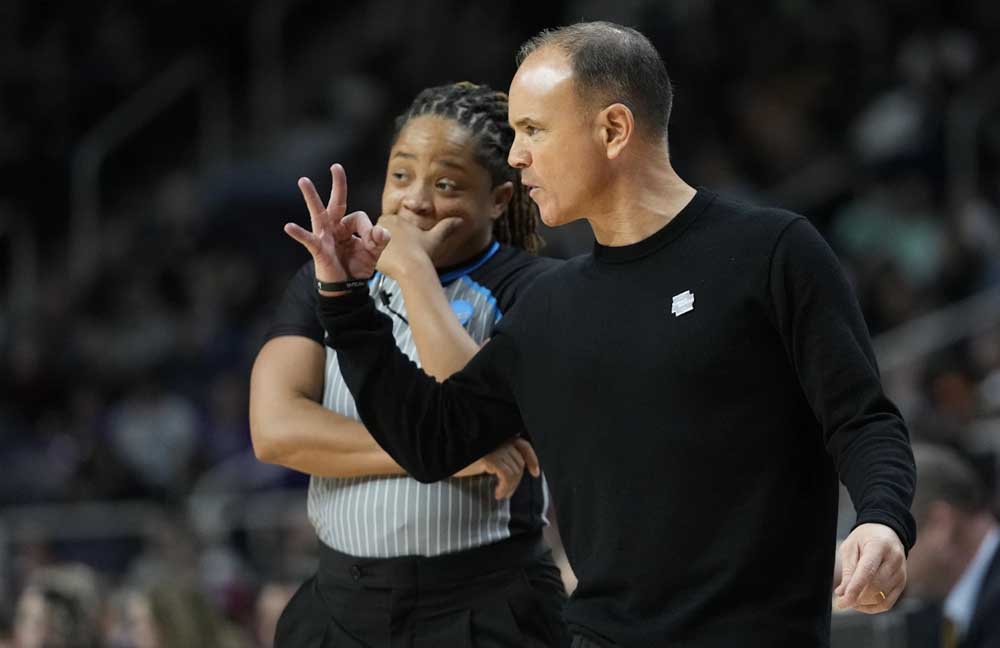Rueck discusses Beavers’ offseason transition
Published 8:57 am Friday, May 17, 2024

- Oregon State women's basketball coach Scott Rueck talks with the referee during the second quarter of a Women's NCAA Tournament game against South Carolina.
CORVALLIS — Perhaps it was inevitable, the collapse of an Oregon State women’s basketball roster that on paper was as strong as any in school history.
Every player from the Beavers’ 2023-24 Elite Eight team was eligible to return next season. But within days of returning from the Albany (New York) Regional, it came apart. Eight players went into the transfer portal.
They came to Oregon State to play in the Pac-12, arguably the country’s best basketball conference. They left because that’s no longer possible, with the Pac-12’s collapse last summer. The choice was stay and play in the West Coast Conference and likely to include several elite nonconference opponents, or transfer.
OSU coach Scott Rueck insists it was almost as simple as that.
“To be honest, I don’t think there’s anything I really could have done differently that would have impacted anything that’s happened,” Rueck said Thursday. “I could have promised that we’re going to play UConn 10 times in the preseason, and I don’t think it would have changed one person’s mind.”
Rueck, who said he loves being at Oregon State, spoke to The Oregonian/OregonLive Thursday about what has transpired with the Beavers and how he plans to reassemble the team.
(This Q and A has been lightly edited for brevity.)
Q: What are your general thoughts and emotions about what has transpired over the last six weeks?
Scott Rueck: It’s a fascinating time. I can’t tell you I’m surprised just because I get the landscape from everyone’s perspectives. It’s easy to see based upon the season that we had, and the changes within our world being Oregon State. It’s just like anything that ends before you’d want it to. There’s a mourning process for the vision that you had for everything and how you wanted it to go. Even with being somewhat braced for it, there’s still a sadness to it. The reality is, it just is what it is. And so, what now? Go to work, and keep doing what we do.
Q: What do you say to Oregon State fans who are frustrated with all that has happened?
Rueck: We had a banquet, and part of it was for that reason.
To celebrate what was one of the best seasons in the program’s history, for sure. It didn’t seem right to me not to celebrate it. Celebrate Italy (last August) to Albany, and everyone was invited to that. I thought it was a special night. Part of it was also just to talk to those people that care the very most about our program and that could be in attendance. I am an Oregon State fan. I’m very sensitive, and care a lot about our fans. I love them and feel the same sadness for them.
I think the best word is it’s kind of tragic because it involves so many things beyond us. It’s caused, just a lot of in some ways, chaos. But it also makes sense if you just look at it from everybody’s perspectives. So it would make sense that somebody who’s invested in our program and cares so much about our team would feel really hurt. That’s logical to me.
I love that they care so much. I understand that emotion they would feel. But the reality is the reality. Our circumstances changed. What these athletes and our families signed up for, changed midstream. So, it’s fair to them to reassess their situation and make a choice.
Q: At the banquet, did the fans get to talk to the players?
Rueck: No, I didn’t think that would be probably something we’d want. You just don’t know. It could go great. It could go not great. Who knows? I wasn’t able to talk to everybody to know where they all stood. and where the emotions were. Certainly, there are emotions involved. It was within the same month, and within a week, (that) people made the decisions. So because of that, we safeguarded that. I shared my perspective and what I hoped everyone’s perspective would be, that this is a celebration. I termed it as a night of gratitude. It was such a fun, amazing year to be a part of. Incredible.
Q: When you got off the plane in Eugene coming back from Albany, did you have a sense of what was coming?
Rueck: There was no way for me personally to know exactly where everybody was. I knew that people were going to need to reassess things and that would be coming. No doubt. I didn’t know people’s decisions at that time. But like I said, I can’t say I was surprised by it. Really anything. Because I know who these people are. We beat everybody for these players in recruiting. This group included two McDonald’s All Americans, and Talia (von Oelhoffen) would have been had she not chosen to join us (by graduating early from high school). So really three McDonald’s All Americans recruits that were recruited by Power 5s. They’re being asked now to play in a conference that they didn’t sign up for. Which is a mid-major compared to a major. So, they have every right to reassess that. I knew that we’d be walking through that process over the next couple of weeks.
Q: Did it feel like a sales meeting?
Rueck: No. There was listening and answering questions and finding out just where people were, and what they wanted to know and what questions I could answer as best I can. And then finding out where everybody was, so we could just have a healthy discussion moving forward.
Q: Was the main issue going from the Pac-12 to the West Coast Conference?
Rueck: It did seem that way, yeah. That was the elephant in the room all year long.
Q: Was name, image and likeness (NIL) much of a factor?
Rueck: It didn’t come up much, if at all.
Q: There is talk that you wanted to keep the focus on the season during the 2023-24 season, and when it finished, talk to the team about next season. If that’s true, in hindsight, was that a mistake?
Rueck: I’m not sure what there was to talk about because I shared what I know. I don’t know what else I could have shared.
I had one conversation with the team just acknowledging the situation. It was the elephant in the room. It’s like this thing, but then I don’t have answers. I don’t know what’s going on. I don’t know how many games we play next year, who we play, where we play. I have a strategy, but we’re in the middle of our season. Everything was just moving as a normal progression. I just felt like I did the right thing for this group this year, and it sure seemed that way.
Q: What do you think about the move to the WCC?
Rueck: I don’t know what to think about it. I’m like everybody else. I signed up to coach in the Pac-10, And now Pac-12. That’s a decision outside of my control. I trust that the administration has done the best they can and that is where it landed.
Q: When you say outside of my control, when athletic director Scott Barnes was making this decision, did he get your opinion on it? Did you have any say on it?
Rueck: I was not a part of any final decision. They asked last fall what our preference would be going forward. What conference we would choose to be in. Of course, you’re looking to remain at the same level.
Q: This team you had coming back was set to win and win big, and yet that apparently wasn’t enough. Is winning a priority any longer in college athletics?
Rueck: I’m the wrong person to ask. It appeared with our group this year that winning mattered a lot. I mean, this team played right, they played hard. They were hyper competitive, and they had a blast all year long. All year. You can’t fake the emotion that this team played with. They loved each other and they loved the game. We were at a very high functioning group this year. There’s no way to do what we did without being that. And so, winning seemed to matter a lot to this group.
Q: Is this a year where you might go more international?
Rueck: That’s certainly one of the avenues available to us. International students have done very well. We’ve had a ton of success. Corvallis is of amazing home away from home and has provided that the international students are very comfortable here. I get to recruit internationally with that confidence and proof of it. There’s great basketball players, all around the world.
I’ll be honest. Our season went to the second to the last week of the season. This has dragged on a bit. Because of that, I haven’t known what I need, exactly. In some cases you’re kind of learning to have a need in mid-April. Your back is to the wall. That’s been one of the challenges.
Q: You’ve long been a relationship-built coach in recruiting, maybe more than most. That all takes time. How difficult is in this situation, with the transfer portal, where decisions are made quickly and you can’t establish deep relationships?
Rueck: We’ve had success with adapting as necessary. I would tell you that the most rewarding experiences I’ve had, of course, are the traditional: three-year recruitment, four-year recruitment, maybe five even sometimes, and then the four-year experience, where there’s tears and hugs and emotion at the end, and on senior day. It lasts, beyond that, right? That has been majority of my career.
I have not, until COVID, had very many transfers. Before COVID, I think I had three transfers in nine years here, and three at George Fox in 14 years. My career has been built off the four-year experience. This new way, there are other things that apparently are mattering more and so you just adapt with it. You are grateful for what you get. In my opinion, it’s not as deep, of course, as the four-year experience.
But if that’s the way it’s working, that’s the way it’s coming in. I love teaching and as long as I get to do that, that’s what fills me.
Q: Are the days of building a program through the high school recruiting ending?
Rueck: At the highest level, it appears that way. Yeah. That’s just what the evidence shows. Teaching is teaching. It’s just how do you find players? That might be different, but we know how to do that clearly.










